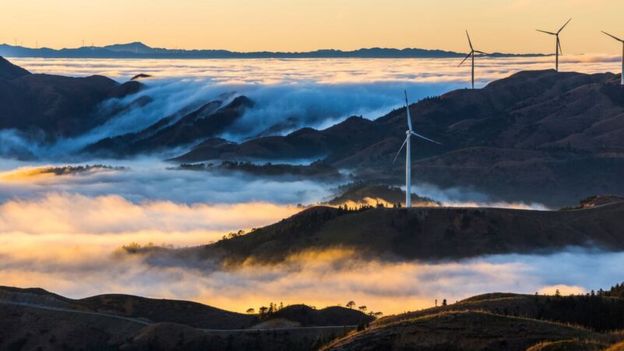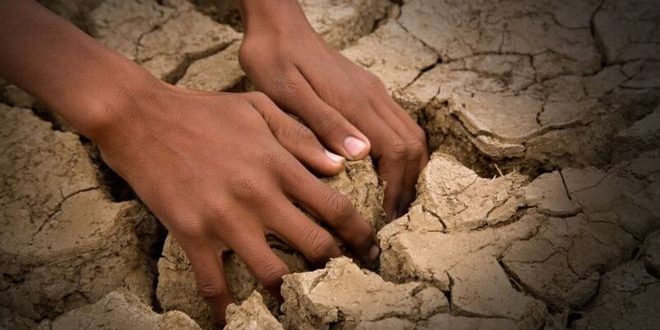It’s the final call, say scientists, the most extensive warning yet on the risks of rising global temperatures.
Their dramatic report on keeping that rise under 1.5 degrees C states that the world is now completely off track, heading instead towards 3C.
Staying below 1.5C will require “rapid, far-reaching and unprecedented changes in all aspects of society”.
It will be hugely expensive, the report says, but the window of opportunity is not yet closed.
After three years of research and a week of haggling between scientists and government officials at a meeting in South Korea, the Intergovernmental Panel on Climate Change (IPCC) has issued a special report on the impact of global warming of 1.5C.
The critical 33-page Summary for Policymakers certainly bears the hallmarks of difficult negotiations between climate researchers determined to stick to what their studies have shown and political representatives more concerned with economies and living standards.
Despite the inevitable compromises, there are some key messages that come through loud and and clear.
“The first is that limiting warming to 1.5C brings a lot of benefits compared with limiting it to 2 degrees. It really reduces the impacts of climate change in very important ways,” said Prof Jim Skea, who is a co-chair of the IPCC.
“The second is the unprecedented nature of the changes that are required if we are to limit warming to 1.5C – changes to energy systems, changes to the way we manage land, changes to the way we move around with transportation.”
What’s the one big takeaway?
“Scientists might want to write in capital letters, ‘ACT NOW IDIOTS’, but they need to say that with facts and numbers,” said Kaisa Kosonen, from Greenpeace, who was an observer at the negotiations. “And they have.”
The researchers have used these facts and numbers to paint a picture of the world with a dangerous fever, caused by humans. We used to think if we could keep warming below 2 degrees this century then the changes we would experience would be manageable.
Not any more. This new study says that going past 1.5C is dicing with the planet’s liveability. And the 1.5C temperature “guard rail” could be exceeded in just 12 years in 2030.
We can stay below it but it will require urgent, large-scale changes from governments and individuals, plus we will have to invest a massive pile of cash every year, around 2.5% of global GDP, for two decades.
Even then, we will still need machines, trees and plants to capture carbon from the air that we can then store deep underground. Forever!
Five steps to 1.5
- Global emissions of CO2 need to decline by 45% from 2010 levels by 2030.
- Renewables are estimated to provide up to 85% of global electricity by 2050.
- Coal is expected to reduce to close to zero.
- Up to 7 million sq km of land will be needed for energy crops (a bit less than the size of Australia).
- Global net zero emissions by 2050.
How much will all this cost?
It won’t come cheap. The report says that to limit warming to 1.5C, it will involve “annual average investment needs in the energy system of around $2.4 trillion” between 2016 and 2035.
Experts believe that this number needs to be put in context.
“There are costs and benefits you have to weigh up,” said Dr Stephen Cornelius, a former UK IPCC negotiator now with WWF, who says that cutting emissions hard in the short term will cost money, but is cheaper than paying for carbon dioxide removal later this century.
“The report also talks about the benefits as there is higher economic growth at 1.5 degrees than there is at 2C, and you don’t have the higher risk of catastrophic impacts at 1.5 that you do at 2.”
What happens if we don’t act?
The researchers say that if we fail to keep temperatures below 1.5C, we are in for some significant and dangerous changes to our world.
You can kiss coral reefs good-bye, as the report says they would be essentially 100% wiped out at 2 degrees of warming.
Global sea-level will rise around 10 centimetres more if we let warming go to 2C, That may not sound like much but keeping to 1.5C means that 10 million fewer people would be exposed to the risks of flooding.
There are also significant impacts on ocean temperatures and acidity, and the ability to grow crops like rice, maize and wheat.
“We are already in the danger zone at one degree of warming,” said Kaisa Kosonen from Greenpeace.
“Both poles are melting at an accelerated rate; ancient trees that have been there for hundreds of years are suddenly dying; and the summer we’ve just experienced – basically, the whole world was on fire.”

Is this plan at all feasible?
That all depends on what you mean. The IPCC scientists are not allowed to prescribe what should be done; they can only outline what the options are. But those involved with this study believe it shows realistic paths to staying under 1.5C.
“It is feasible if we all put our best foot forward, and that’s a key message of this report. No-one can opt out anymore,” said Dr Debra Roberts, who’s a co-chair of the IPCC.
“We all have to fundamentally change the way we live our lives; we can’t remain remote from the problem anymore.
“The report is very clear, this can be done, but it will require massive changes, socially and politically and accompanied by technological development.”
Is all this about saving small island states?
The idea of keeping the global temperature rise to 1.5 is something very close to the hearts and minds of small island and low-lying states who fear they will be inundated with flooding if temperatures go to 2 degrees.
But over the three years that the report was in preparation, more and more scientific evidence has been published showing that the benefits of staying close to 1.5C are not just for island nations in the Pacific.
“If you save a small island country then you save the world,” said Dr Amjad Abdulla, who’s an IPCC author from the Maldives. “Because the report clearly states that no-one is going to be immune. It’s about morality – it’s about humanity.”
How long have we got?
Not long at all. But that issue is now in the hands of political leaders. The report says that hard decisions can no longer be kicked down the road. If the nations of the world don’t act soon, they will have to rely even more on unproven technologies to take carbon out of the air – an expensive and uncertain road.
“They really need to start work immediately. The report is clear that if governments just fulfil the pledges they made in the Paris agreement for 2030, it is not good enough. It will make it very difficult to consider global warming of 1.5C,” said Prof Jim Skea.
“If they read the report and decide to increase their ambitions and act more immediately then 1.5C stays within reach – that’s the nature of the choice they face.”
Campaigners and environmentalists, who have welcomed the report, say there is simply no time left for debate.
“This is the moment where we need to decide” said Kaisa Kosonen.
“We want to move to clean energy, sustainable lifestyles. We want to protect our forests and species. This is the moment that we will remember; this is the year when the turning point happened.”
What can I do?
The report says that there must be rapid and significant changes in four big global systems – energy, land use, cities and industry.
“This is not about remote science; it is about where we live and work, and it gives us a cue on how we might be able to contribute to that massive change,” said Dr Debra Roberts.
“You might say you don’t have control over land use, but you do have control over what you eat and that determines land use.
“We can choose the way we move in cities and if we don’t have access to public transport – make sure you are electing politicians who provide options around public transport.”
–
BBC
 UAE BARQ برق الإمارات – نبضك
UAE BARQ برق الإمارات – نبضك


